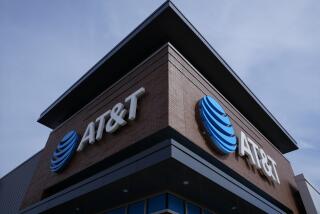Cellphone Firms Responding to Signals of Dissatisfaction
- Share via
After years of touting their networks, mobile phone companies are trying a new tack to keep customers: being nice.
The nation’s four biggest wireless providers are polishing their manners after getting consistently poor marks in customer satisfaction surveys. A Consumer Reports magazine survey, released Monday, ranked the satisfaction level below that of health maintenance organizations and cable TV companies.
Rather than rely solely on efforts to widen coverage, improve reception and curtail dropped calls, cellphone companies are explaining the fine print in contracts, offering more generous return policies or adjusting their calling plans to reduce exorbitant overage charges.
Building a better reputation is all the more important as fiercely competitive companies face a saturated market that forces them to chase one another’s customers.
“All the carriers will have cool cellphones and technology,” said Michael Bennett, director of customer affairs at Cingular Wireless. “It’s the consumer-friendly services that can be the differentiator. Competition will occur in this area.”
Whether the efforts are paying off is unclear. Some private surveys suggest they aren’t, but statistics compiled by the Federal Communications Commission indicate that they may be.
The number of complaints to the federal agency dropped 16% in the first nine months this year from the same period last year. And the number of gripes about billing and rates -- by far the biggest single category -- fell 13%.
Tell that to Greg Randall of Woodland Hills, who gave Verizon Wireless “an A” on technical quality but flunked it on customer service.
A run-in with the company over a billing issue this year took more than a month and nearly a dozen phone calls to resolve, he said.
“They were very pleasant but very unresponsive,” Randall said. “They give you a lot of talk and not much of anything else. When you get off the phone, you wonder if you just got screwed.”
Rhod Zimmerman of West Hills was one of numerous former AT&T; Wireless customers upset with how Cingular has handled them since its acquisition of AT&T; Wireless last year.
“Their attempts at appeasing me were measly,” he said. “They did only what they had to do.”
A recent study by marketing information firm J.D. Power & Associates found that overall satisfaction with wireless service providers dropped 10% during 2004, the biggest year-over-year change since it began studying such performance in 1995.
Unlike the FCC statistics, J.D. Power’s report surveys consumer attitudes nationwide, said company analyst Kirk Parsons. “Normally, the FCC only gets people who are really mad, so the complaints are not like a general consumer study and are not representative of the country as a whole,” he said.
The nation’s top carriers -- which serve 86% of the cellphone subscribers -- insist that they are gaining ground, even as the number of wireless users overtook the number of land-line customers this year.
Sprint Nextel Corp., for instance, bases part of employee salaries, from those of front-line workers to those of senior managers, on how well they treat customers.
“People tell us they want to talk to someone pleasant and to get the problem fixed on the first call. And they don’t want to wait a long time on the [telephone] line or in the store,” said Cindy Rock, Sprint’s senior vice president for customer service. “We’re very focused on all three areas.”
Analysts are skeptical. Their surveys, which show some upbeat signs, nevertheless find that people are still upset and that satisfaction levels continue to erode.
The FCC numbers really don’t indicate much, said Mark Kotkin, Consumer Reports’ associate survey research director. “In our opinion, service hasn’t changed much in four years in terms of quality and customer service,” he said.
Of 50,000 magazine subscribers polled in 18 metropolitan markets, 47% said they were completely or very satisfied overall, “which is not a particularly good score related to other services,” Kotkin said.
Parsons said the industry had created unrealistic expectations by over-hyping its products and services. “In general,” he said, “the carriers have not kept up with consumer expectations, and those expectations are rising.”
Analyst Charles Golvin at Forrester Research Inc. said his firm’s recent survey showed that customer satisfaction with cellphones continued to drop, though at a slower pace. But the results also showed that the level of dissatisfaction fell dramatically.
“It says to me that people are more and more resigned to the service they get,” Golvin said. “The overall trend is a move toward apathy.”
Carriers are poaching more from competitors than they are mining new customers. Even that’s getting harder, though. Industrywide, just 1.9% of cellphone users jumped from one carrier to another in the second quarter.
The industry’s leaders are trying to set themselves apart.
* Cingular, the largest carrier, with 52.3 million users, simplified its contracts, laying out all charges upfront, and doubled its return policy, or trial period, to 30 days. It also is improving its cellphone Internet service to provide information more quickly.
* Verizon Wireless, the second-largest carrier, with 49.3 million customers, is a perennial leader in surveys for best cellphone service. It goes through an extensive checklist with new buyers to make sure the phone and its features work before the customers leave the store, part of changes made since it realized 18 months ago that service wasn’t keeping up with exploding growth.
* Sprint, third-largest with 45.6 million users, got rid of high overages with its Fair & Flexible plan, which automatically gives customers 50 minutes extra for $5 more whenever they go over their allotted minutes of use. It also has plans that let customers take incoming calls free, and it ditched unpopular mail-in rebates in favor of instant ones.
* T-Mobile USA, fourth-largest with 20.3 million customers, has a detailed map on its website to help customers determine whether its service is right for them. The map of its smaller network, concentrated in more populous areas, shows signal strength down to a customer’s block and neighborhood. It is now ranked generally as the best or second-best wireless carrier in the nation.
All the companies are trying to stall efforts by states to set customer service levels. California regulators, which adopted the first and most aggressive rules 18 months ago, put a so-called consumer bill of rights on the shelf this year.
In a settlement with 33 state attorneys general last year, Cingular, Verizon Wireless and Sprint agreed to provide basic customer benefits, such as a minimum 14-day return policy, that they largely had in place already. California was not part of the agreement.
But nothing in that agreement would have helped Greg Randall with his billing problem or Rhod Zimmerman with his cellphone issue.
Cingular has been trying to move AT&T; Wireless customers to new phones on a new network. In mid-July, Zimmerman said, he got a letter from Cingular saying it would no longer support his old phone. The glitch: The company wouldn’t free him from his contract without a $175 penalty for each of his two phones.
“They gave me a customer service number to call, but customer service people didn’t know anything about it,” Zimmerman said.
After numerous letters over two months and complaints to the state Public Utilities Commission, Cingular relented, allowing him to leave without a penalty. “Just the threat of the PUC was great,” Zimmerman said.
Randall, who bought his first cellphone in 1993, made one of his periodic calls to Verizon Wireless early this year to check on better rates, more minutes or, in general, a better deal. A sales agent told him the company had been overcharging him $5 a month for at least six months, but she could offer a refund for only three months.
The issue became a cause for Randall, who manages a watch-manufacturing plant and didn’t care about the remaining $15.
“They’re banking on the fact that you’re not going to catch them,” he said. “How much are they going to make today from everyone else who didn’t catch them?”
In going up the ladder of supervisors, he said, he learned that it was his responsibility to check for the accuracy of his bills, even though the company erred. Finally, a senior official apologized and agreed to refund the entire amount.
Verizon Wireless said it had no policy limiting refunds to three months or six months. But snafus can occur despite employee training and updates every month, said Don Dumond, a Southern California consumer service executive for the firm.
“I’m proud the service rep pointed the error out to him,” Dumond said. “Sometimes, the service rep goes to a supervisor and acts as an advocate for customers. If we know of an error, we’ll correct it.”






